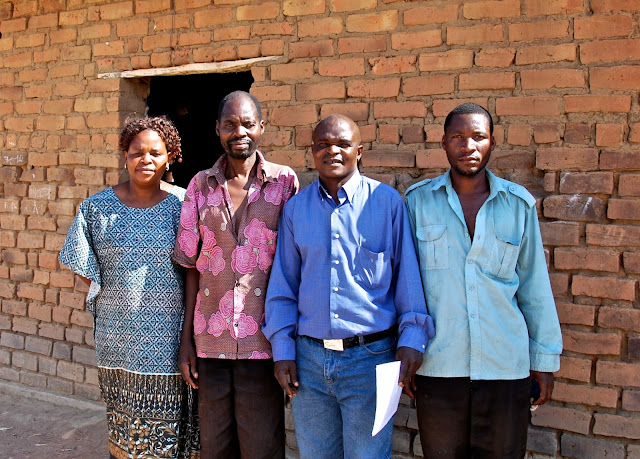Our visits to schools continued with a visit to Molosi,
Mtelwe, Donje and Kavinaka. We
were able to visit the first three villages in one day but due to the distance from
Lundazi to Kavinaka we had to make a special trip taking the good part of another day to reach Kavinaka.
MOLOSI
I have visited Molosi a few times in the past. I found out that Mr. Lungu, a long time
teacher, had quit teaching, student enrollment had decreased, and only one
government teacher remained. After
a conversation with the government teacher I asked if I could speak with Mr.
Lungu. Mr. Lungu came to the school and
I encouraged him to start teaching again in the next term. I am hoping he is able to do so. He really loves the children and they
love him. I think he became
discouraged with the lack of support from the community.
MTELEWE
Although I know one of the teachers, Drackson Banda, I had
never visited his village. He was not around to meet us but the headman of the village greeted us
enthusiastically. I was encouraged to find out the headman is a retired
government-school teacher. He
supports education and is a positive influence on the village in this regard.
The other teacher is young and enthusiastic. He seems to love children as evidenced by carrying this
young one as we walked along. The school building is finished, complete with a floor and
desks but little to no materials.
The school would also like their own borehole so they do not have to share
with the village and the cattle.
 |
| Posing with the headman and several villagers |
 |
| Mabuchi with the volunteer teacher and his young friend |
The village itself is clean and the villagers - very industrious. They have made many blocks to use for constructing new buildings. Their houses are beautifully well-maintained. There is much pride in this village.
 Our final stop for the day was Donje. I was pleased to greet Chifubu Zimba, a
teacher Bob and I have both trained.
He grasps concepts quickly and reports he still uses many of the
instructional strategies he learned a couple years ago. The school has 5 teachers, 2 whom I have
trained in the past. I was unable
to observe any classes in session since we arrived late in the day. The school appears to be growing in
this supportive community. The
school however has no floor which become quite muddy in the rainy season and the villagers must walk 2 – 3 kilometers to the
stream for water, as they have no borehole. They are looking forward to continuing the development of their village.
Our final stop for the day was Donje. I was pleased to greet Chifubu Zimba, a
teacher Bob and I have both trained.
He grasps concepts quickly and reports he still uses many of the
instructional strategies he learned a couple years ago. The school has 5 teachers, 2 whom I have
trained in the past. I was unable
to observe any classes in session since we arrived late in the day. The school appears to be growing in
this supportive community. The
school however has no floor which become quite muddy in the rainy season and the villagers must walk 2 – 3 kilometers to the
stream for water, as they have no borehole. They are looking forward to continuing the development of their village.
KAVINAKA
The following day we headed to a very rural village called Kavinaka. On the way we stopped at this market
where the woman pictured here extended her hand into the car and told me I need
to buy "this." I don’t know about you
but it looked like some type on dung to me and I couldn’t understand why I
would need to buy it. Mabuchi
explained it was floor wax to apply to cement floors. I told the woman I was sorry but didn't need any wax at this time. I’m happy to report by the time we returned to the market
later that afternoon the woman had sold all her floor wax.
 |
| The new school building |
The students have no furniture but learning appears to be taking place. The villagers are grateful to the World Servants, a group from the Netherlands, who started building the school in August. They also expressed the difference a borehole has made to their daily lives.












No comments:
Post a Comment